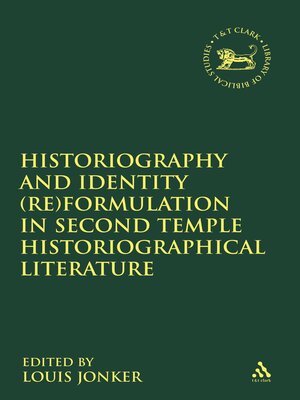Historiography and Identity (Re)formulation in Second Temple Historiographical Literature
ebook ∣ The Library of Hebrew Bible/Old Testament Studies
By Louis Jonker

Sign up to save your library
With an OverDrive account, you can save your favorite libraries for at-a-glance information about availability. Find out more about OverDrive accounts.
Find this title in Libby, the library reading app by OverDrive.



Search for a digital library with this title
Title found at these libraries:
| Library Name | Distance |
|---|---|
| Loading... |
It is commonly accepted in various disciplines and contexts that history writing often (if not always!) contribute to the process of identity (re)formation. Using the past in order to find a renewed identity in new (socio-political and socio-religious) circumstances, is something that we also witness in Hebrew Bible historiographies. The so-called Deuteronomistic History, as well as the works of Chronicles and Ezra-Nehemiah, are often read from the perspective of a community trying to find a new identity in changed circumstances.
In the Historical Books section at the 2008 Auckland SBL International Meeting, this perspective was investigated further. The papers presented included theoretical reflections on the relationship between historiography and identity (re)formation, as well as illustrations from Hebrew Bible historiographies (of the Exilic and Second Temple periods). These papers, together with a few responses to the papers, are offered here to a wider scholarly audience.
Contributors include Jon Berquist, Mark Brett, Louis Jonker, Mark Leuchter, Christine Mitchell, Klaas Spronk, Gerrie Snyman, Ray Person, Armin Siedlecki, and Jacob Wright.
In the Historical Books section at the 2008 Auckland SBL International Meeting, this perspective was investigated further. The papers presented included theoretical reflections on the relationship between historiography and identity (re)formation, as well as illustrations from Hebrew Bible historiographies (of the Exilic and Second Temple periods). These papers, together with a few responses to the papers, are offered here to a wider scholarly audience.
Contributors include Jon Berquist, Mark Brett, Louis Jonker, Mark Leuchter, Christine Mitchell, Klaas Spronk, Gerrie Snyman, Ray Person, Armin Siedlecki, and Jacob Wright.







